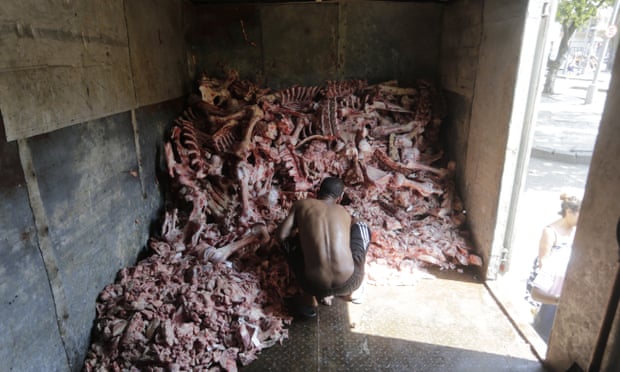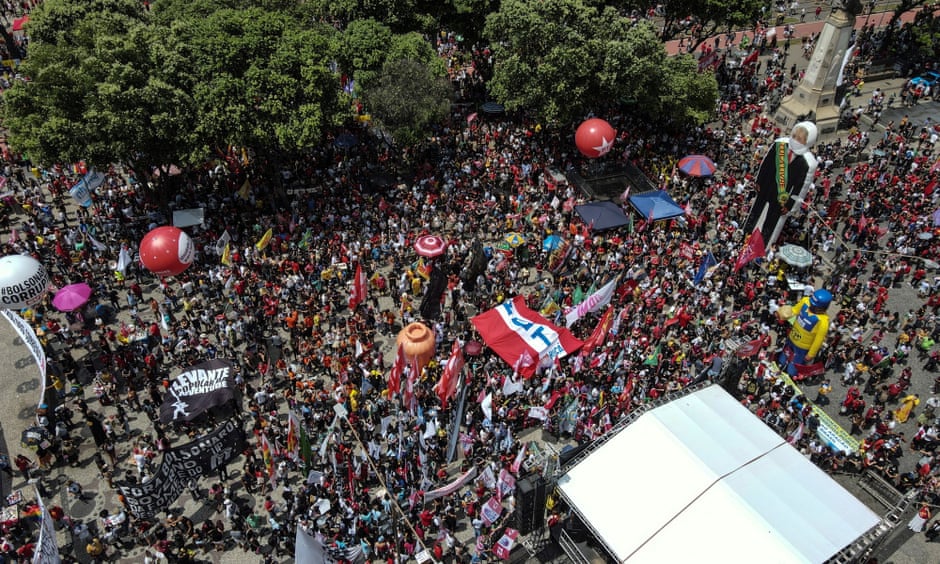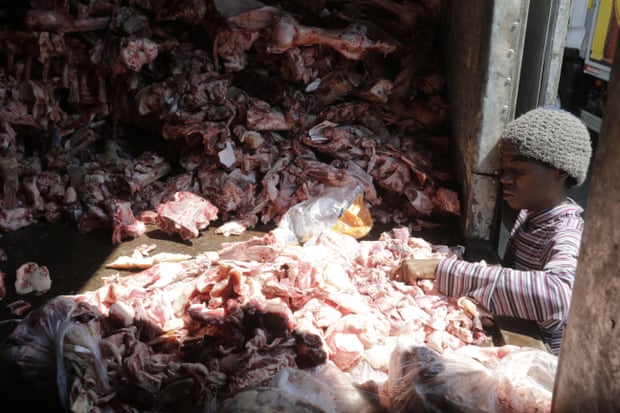Brazil - Outcry in Brazil over photos of people scavenging through animal carcasses
Pictures of destitute Brazilians searching scraps for food lay bare scale of economic and social crisis
Heart-wrenching photographs of destitute Brazilians scavenging through a heap of animal carcasses for food have laid bare the hunger crisis blighting Latin America’s most populous nation, where millions have been plunged into deprivation by the coronavirus pandemic and soaring inflation.
The images, taken in Rio last week by the prize-winning photojournalist Domingos Peixoto, show the group rummaging for scraps in the back of a lorry that had been transporting the discarded offal and bones to a factory that makes pet food and soap.
“Some days … I want to cry,” the lorry’s driver, José Divino Santos, told the reporter Rafael Nascimento de Souza, who was covering the story with Peixoto for the Rio newspaper Extra.
“Before people would come and ask for a piece of bone for their dogs. These days they beg for bones to make food,” added Santos, who distributes the scraps to Rio’s needy after collecting them from supermarkets.
One 51-year-old scavenger, Denise da Silva, said she needed to feed her five children and 12 grandchildren having recently lost her partner. “It’s been so long since I saw a bit of meat, since before the pandemic … I’m so grateful for this,” Silva said of the fragments.
The images, one of which appeared on Extra’s front page under the headline “Brazil 2021: the pain of hunger”, sparked an immediate outcry.
"Antes as pessoas passavam aqui e pediam um pedaço de osso para dar pros cachorros. Hoje elas imploraram por um pouco de ossada pra fazer comida. O meu coração doi" - José Divino, motorista do caminhão dos ossos pic.twitter.com/cx6mtKeue5
— Cecília Olliveira (@Cecillia) September 29, 2021
An estimated 19 million Brazilians have gone hungry since the start of a Covid outbreak that has killed 600,000 people. Elsewhere in the region the suffering is even more intense. Last week, a top Venezuelan university said nearly 77% of citizens there lived in extreme poverty, with crippling fuel shortages and Covid to blame for a 10% jump over the last year.
Thousands of protesters marched through the streets of Rio on Saturday to denounce a social calamity many blame on Brazil’s rightwing president, Jair Bolsonaro, whose Covid response has been globally condemned.
“It’s inhumane,” said Alex Frechette, a 43-year-old artist, who was carrying one of his paintings showing Bolsonaro chuckling beside three black children who clutched bowls filled with bones.
José Manuel Ferreira Barbosa, a 63-year-old decorator from Rio’s impoverished northern outskirts, also blamed the president for Brazil’s hunger crisis. “Things are really tough right now. Some people are eating bones. Others have nothing to eat at all,” Barbosa said as he took to the streets.
“It’s a disgrace,” agreed Rosa Maria Xavier da Silva, 53, a street hawker who lives in a squat in central Rio and is struggling to feed eight grandchildren with a monthly benefit payment of 150 reais (£20).
During a congressional hearing into Brazil’s Covid catastrophe, the leftist senator Humberto Costa said Peixoto’s photos exposed the social tragedy unfolding under Bolsonaro. “Unemployment is rising. Inequality is growing. Poverty is growing. Hunger has returned. This is what this government … has done to our country,” Costa said.
Even after three decades documenting Rio’s drug conflict and social ills, Peixoto, 57, said he had been shocked to see citizens sifting through carcasses. “I haven’t slept for two days, trying to process it all,” said the photographer, who struggled to remember seeing so many homeless on the streets.
“People are having to cook with firewood – and not just the homeless … Damn, we’ve got to find ways to tell these stories to see if we can help in some way,” he added.
Peixoto said he was haunted by the memory of one scavenger he had seen smiling as the lorry arrived to share its gut-churning cargo. “He looked so happy … [because] he knew it meant another day’s food on their table,” Peixoto said, adding: “I didn’t take the picture. It was one of those images you just take with your eyes and store in your heart.”
De Souza, the reporter, remembered urging one woman not to consume the thrown-away meat. “Young man, either we eat this or we starve to death,” she replied.
“This is the reality,” said the 30-year-old journalist. “If this doesn’t make you angry, if this doesn’t move you, then I don’t know [what will].”



